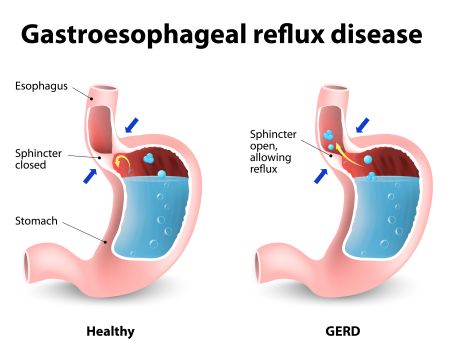GERD
 Gastroesophageal Reflux Disease (GERD) describes a backflow of acid from the stomach into the swallowing tube or esophagus. When you swallow, the lower esophageal sphincter (a circular band of muscle around the bottom part of your esophagus) relaxes to allow food and liquid to flow down into your stomach. It then closes again. However, if this valve relaxes abnormally or weakens, stomach acid can flow back up into your esophagus, causing frequent heartburn and disrupting your daily life. This acid can irritate and sometimes damage the delicate lining on the inside of the esophagus. Almost everyone experiences gastroesophageal reflux at some time. The usual symptom is heartburn, an uncomfortable burning sensation behind the breastbone, most commonly occurring after a meal. In some individuals this reflux is frequent or severe enough to cause more significant problems, that is a disease. Thus, Gastroesophageal Reflux Disease (GERD) is a clinical condition that occurs when reflux of stomach acid into the esophagus is severe enough to impact the patient’s life and/or damage the esophagus.
Gastroesophageal Reflux Disease (GERD) describes a backflow of acid from the stomach into the swallowing tube or esophagus. When you swallow, the lower esophageal sphincter (a circular band of muscle around the bottom part of your esophagus) relaxes to allow food and liquid to flow down into your stomach. It then closes again. However, if this valve relaxes abnormally or weakens, stomach acid can flow back up into your esophagus, causing frequent heartburn and disrupting your daily life. This acid can irritate and sometimes damage the delicate lining on the inside of the esophagus. Almost everyone experiences gastroesophageal reflux at some time. The usual symptom is heartburn, an uncomfortable burning sensation behind the breastbone, most commonly occurring after a meal. In some individuals this reflux is frequent or severe enough to cause more significant problems, that is a disease. Thus, Gastroesophageal Reflux Disease (GERD) is a clinical condition that occurs when reflux of stomach acid into the esophagus is severe enough to impact the patient’s life and/or damage the esophagus.
GERD Symptoms
Classic symptoms of GERD, or Gastroesophageal Reflux Disease, include:
- Repeated bouts of heartburn (a burning feeling in the chest) and acid regurgitation
- Bitter or sour-tasting fluids (acid reflux)in the back of the mouth or throat
- Belching
- Pain in the upper abdomen
- Worsening of the above symptoms when bending over or lying down
- Chest pain
- Difficulty swallowing (dysphagia)
- A dry cough, hoarseness or a sore throat
Non-Surgical Treatment Options for Acid Reflux and GERD
We will work with you to determine the best treatment option to relieve your symptoms. These may include lifestyle changes, medication, and possible surgery.
Some of the following lifestyle or medication changes may alleviate your symptoms of GERD:
- Avoid smoking, caffeine, alcohol, chocolate, peppermint, citrus, colas and fatty foods
- Raise the head of your bed
- Avoid eating food close to bedtime (eat meals at least 3-4 hours prior to lying down, avoid bedtime snacks)
- Eat moderate portions of food and smaller meals
- Eat meals more slowly
- Lose excess weight
- Some over-the-counter antacids may offer relief
If the above-mentioned lifestyle or medication changes do not offer relief, you will need to undergo additional testing. Surgery may be an option when treatment with medications does not completely relieve symptoms. It is also a good option for patients whose symptoms are well controlled but who don’t want to take medication, and for patients with complications of reflux disease, such as ulcers, strictures or Barrett’s esophagus. Anti-reflux operations (Laparoscopic or Open Nissen Fundoplication) may help patients who have persistent symptoms despite medical treatment.
Laparoscopic Anti-Reflux Surgery (Nissen Fundoplication)
Surgery is an alternative that is generally applied when long-term medical management is either ineffective or undesirable, or when certain complications of GERD are present. This surgery is commonly referred to as Laparoscopic Fundoplication surgery.
Laparoscopic Fundoplication surgery will improve the natural barrier between your stomach and esophagus. This prevents the flow of acids from the stomach into the esophagus and strengthens the valve between the esophagus and stomach. This will stop acid from backing up into the esophagus as easily. It can also be performed as an open surgery if necessary.
Anti-reflux surgery can breakdown, similar to hernia repairs in other parts of the body. The recurrence rate is not well defined but may be in the range of 10-30% over 20 years. A number of factors can contribute to this breakdown. In some individuals, even after surgery, reflux symptoms may persist and the use of medication may need to continue.
Getting back to normal
The laparoscopic surgery usually requires one overnight hospital stay. You should be able to return to normal activities between one and two weeks, compared with four to six weeks for traditional surgery. Make sure to take it easy upon your return home, avoiding heavy lifting and vigorous exercise. You may advance your diet as able. You should continue all of your usual home medications. Your anti-reflux medicine should be continued until your initial follow-up. This may be discontinued during the postoperative visit.
